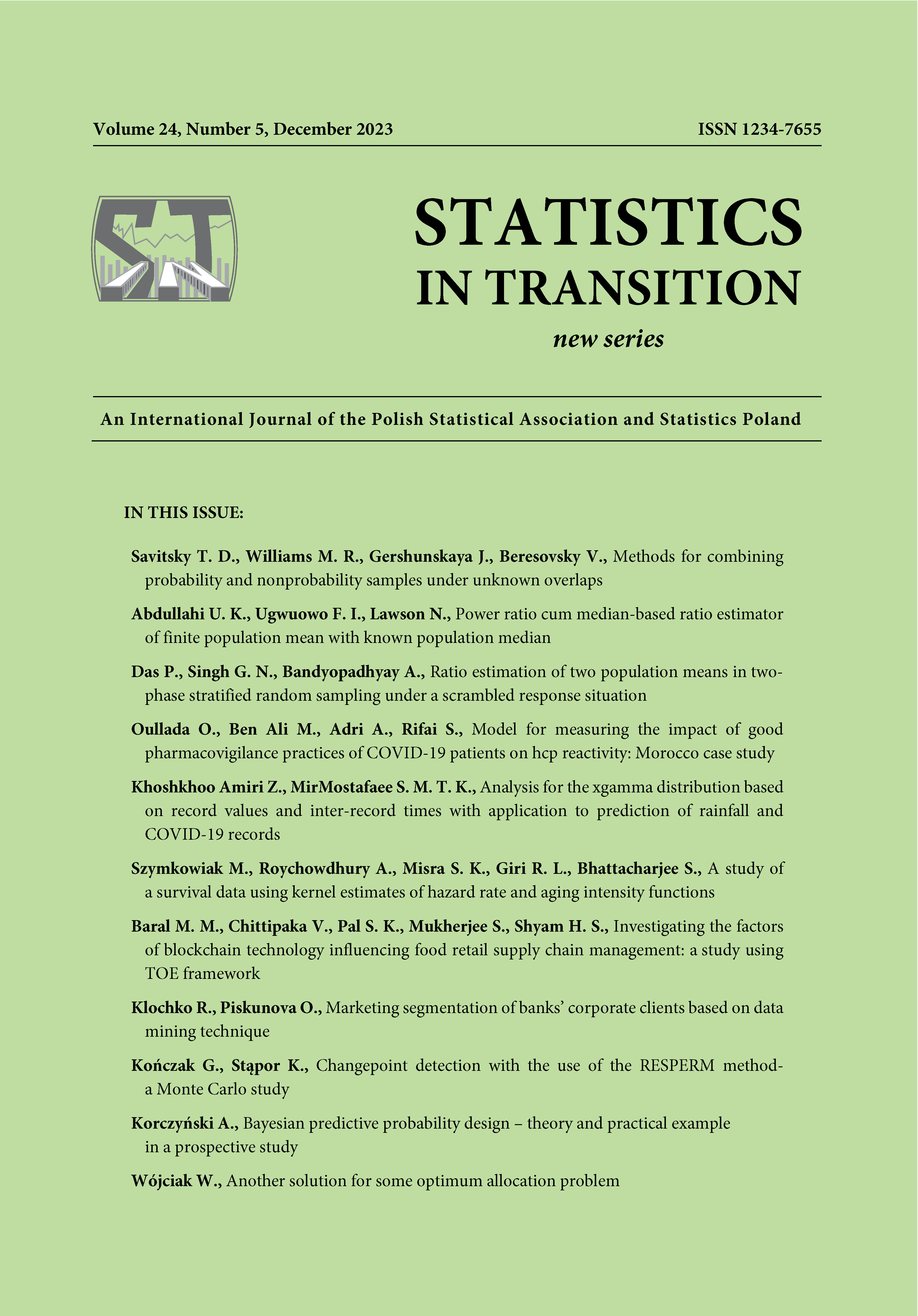ARTICLE
ABSTRACT
We derive optimality conditions for the optimum sample allocation problem in stratified sampling, formulated as the determination of the fixed strata sample sizes that minimize the total cost of the survey, under the assumed level of variance of the stratified 𝜋 estimator of the population total (or mean) and one-sided upper bounds imposed on sample sizes in strata. In this context, we presume that the variance function is of some generic form that, in particular, covers the case of the simple random sampling without replacement design in strata. The optimality conditions mentioned above will be derived from the Karush-Kuhn- Tucker conditions. Based on the established optimality conditions, we provide a formal proof of the optimality of the existing procedure, termed here as LRNA, which solves the allocation problem considered. We formulate the LRNA in such a way that it also provides the solution to the classical optimum allocation problem (i.e. minimization of the estimator’s variance under a fixed total cost) under one-sided lower bounds imposed on sample sizes in strata. In this context, the LRNA can be considered as a counterparty to the popular recursive Neyman allocation procedure that is used to solve the classical problem of an optimum sample allocation with added one-sided upper bounds. Ready-to-use R-implementation of the LRNA is available through our stratallo package, which is published on the Comprehensive R Archive Network (CRAN) package repository.
KEYWORDS
stratified sampling, optimum allocation, minimum cost allocation under upper bounds, optimum allocation constant variance, optimum allocation under lower bounds, recursive Neyman algorithm
REFERENCES
Bethel, J., (1989). Sample allocation in multivariate surveys. Survey Methodology, 15(1), pp. 47–57. https://www150.statcan.gc.ca/n1/en/catalogue/12-001-X198900114578
Boyd, S., and Vandenberghe, L., (2004). Convex Optimization, Cambridge University Press, Cambridge.
Chatterjee, S., (1968). Multivariate Stratified Surveys. Journal of the American Statistical Association, 63(322), pp. 530–534. https://doi.org/10.2307/2284023
Choudhry, G. H., Hidiroglou, M. and Rao, J., (2012). On sample allocation for efficient domain estimation. Survey Methodology, 38(1), pp. 23–29. https://www150.statcan.gc.ca/n1/en/catalogue/12-001-X201200111682
Cochran, W. G., (1977). Sampling Techniques, 3rd edn, John Wiley & Sons, New York.
Dalenius, T., (1949). Den nyare utvecklingen inom teorin och metodiken för stickprovsundersökningar. Förhandlingar vid Nordiska Statistikermötet i Helsingfors den 13 och 14 juni 1949, Helsingfors, pp. 46–74.
Dalenius, T., (1953). The multivariate sampling problem. Skandinavisk Aktuarietidskrift, 36, pp. 92–102.
Dalenius, T., (1957). Sampling in Sweden: Contributions to the Methods and Theories of Sample Survey Practice, Almqvist & Wiksell, Stockholm.
Friedrich, U., Münnich, R., de Vries, S. and Wagner, M., (2015). Fast integer-valued algorithms for optimal allocations under constraints in stratified sampling. Computational Statistics & Data Analysis, 92, pp. 1–12. https://www.sciencedirect.com/science/article/pii/S0167947315001413
Hartley, H. O. and Hocking, R. R., (1963). Convex Programming by Tangential Approximation. Management Science, 9(4), pp. 600–612. https://doi.org/10.1287/mnsc.9.4.600
Hughes, E., and Rao, J. N. K., (1979). Some problems of optimal allocation in sample surveys involving inequality constraints. Communications in Statistics-theory and Methods, 8, pp. 1551–1574.
Khan, M. G. M., Ahsan, M. J. and Jahan, N., (1997). Compromise allocation in multivariate stratified sampling: An integer solution. Naval Research Logistics (NRL), 44(1), pp. 69– 79. https://doi.org/10.1002/(SICI)1520-6750(199702)44:1<69::AID-NAV4>3.0.CO;2-K
Kokan, A. R., (1963). Optimum Allocation in Multivariate Surveys. Journal of the Royal Statistical Society. Series A (General), 126(4), pp. 557–565. https://doi.org/10.2307/2982579
Kokan, A. R. and Khan, S., (1967). Optimum Allocation in Multivariate Surveys: An Analytical Solution, Journal of the Royal Statistical Society. Series B (Methodological), 29(1), pp. 115–125. https://doi.org/10.1111/j.2517-6161.1967.tb00679.x
Lednicki, B. and Wieczorkowski, R., (2003). Optimal Stratification and Sample Allocation between Subpopulations and Strata. Statistics in Transition, 6(2), pp. 287– 305. https://stat.gov.pl/download/gfx/portalinformacyjny/en/defaultstronaopisowa/3432/1/1/sit_volume_4-7.zip
Neyman, J., (1934). On the Two Different Aspects of the Representative Method: the Method of Stratified Sampling and the Method of Purposive Selection. Journal of the Royal Statistical Society, 97(4), pp. 558–625.
R Core Team, (2023). R: A Language and Environment for Statistical Computing, R Foundation for Statistical Computing, Vienna, Austria. https://www.R-project.org/
Skibicki, M. and Wywiał, J., (2002). On optimal sample allocation in strata, in J. Paradysz (ed.). Statystyka regionalna w słuz˙bie samorza˛du lokalnego i biznesu, Internetowa Oficyna Wydawnicza Centrum Statystyki Regionalnej, Pozna´n, pp. 29–37.
Stenger, H. and Gabler, S., (2005). Combining random sampling and census strategies - Justification of inclusion probabilities equal to 1. Metrika, 61(2), pp. 137–156. https://doi.org/10.1007/s001840400328
Särndal, C.-E., Swensson, B. and Wretman, J., (1992). Model Assisted Survey Sampling, Springer, New York.
Tschuprow, A. A., (1923a). On the mathematical expectation of the moments of frequency distributions in the case of correlated observation (Chapters 1-3), Metron, 2(3), pp. 461– 493.
Tschuprow, A. A., (1923b). On the mathematical expectation of the moments of frequency distributions in the case of correlated observation (Chapters 4-6), Metron, 2(4), pp. 636– 680.
Thompson, W. A., (1962). The problem of negative estimates of variance components. Annals of Mathematical Statistics, 33, pp. 273–289.
Wesołowski, J., Wieczorkowski, R. and Wójciak, W., (2021). Optimality of the Recursive Neyman Allocation. Journal of Survey Statistics and Methodology, 10(5), pp. 1263–1275. https://academic.oup.com/jssam/article-pdf/10/5/1263/46878255/smab018.pdf
Wright, S. E., Noble, R. and Bailer, A. J., (2007). Equal-precision allocations and other constraints in stratified random sampling. Journal of Statistical Computation and Simulation, 77(12), pp. 1081–1089. https://doi.org/10.1080/10629360600897191
Wright, T., (2017). Exact optimal sample allocation: More efficient than Neyman. Statistics & Probability Letters, 129, pp. 50–57. https://www.sciencedirect.com/science/article/pii/S0167715217301657
Wright, T., (2020). A general exact optimal sample allocation algorithm: With bounded cost and bounded sample sizes. Statistics & Probability Letters, 165, pp. 108829. https://www.sciencedirect.com/science/article/pii/S0167715220301322
Wójciak, W., (2023). stratallo: Optimum Sample Allocation in Stratified Sampling. R package version 2.2.0. https://CRAN.R-project.org/package=stratallo Yates, F., (1960). Sampling Methods for Census and Surveys, Griffin and Company, Ltd., London.
